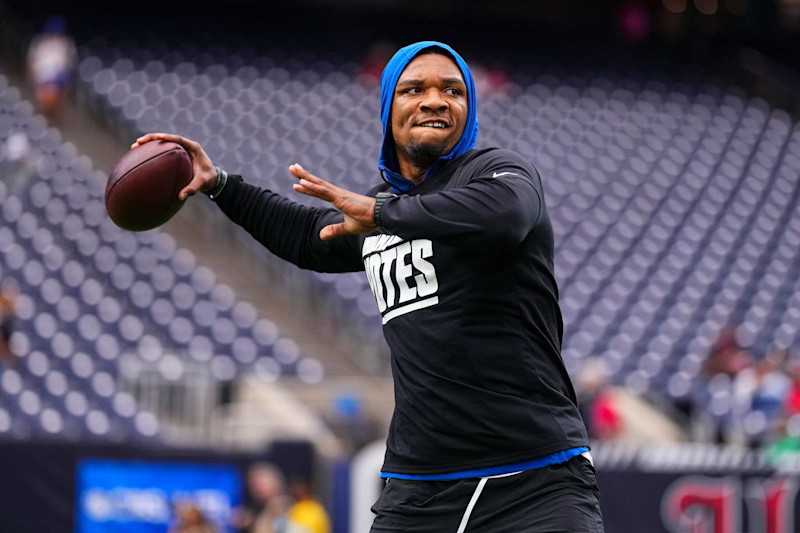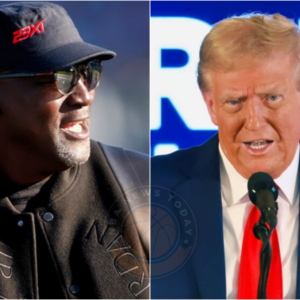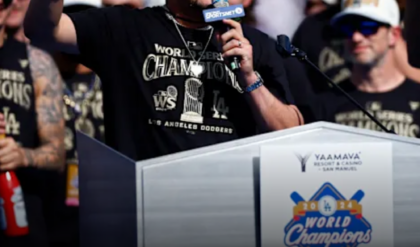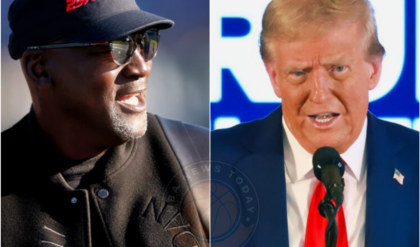
Cooper Neill/Getty Images
Add ESPN NFL draft guru Mel Kiper Jr. to the list of people who think NFL teams aren’t doing a good job of developing young quarterbacks as they come into the league amid the discussion around Anthony Richardson being benched by the Indianapolis Colts.
On the latest episode of First Draft (starts at 15:00 mark), Kiper explained he would advise any college quarterback unless they are going to be the No. 1 pick who is mentally and physically ready to play right away to stay in college “as long as you can because they’re not developing quarterbacks in the NFL.”
One of the notable responses to Richardson’s benching was about how the NFL is failing young quarterbacks by not giving them the time to fail early in their career so they can learn what not to do later on.
ESPN’s Sam Block made this argument on X, along with a list of recent first-round draft picks age 26 or younger who have been benched or traded by their original team.
The first response to Block’s post did point out there are plenty of developmental success stories at the position.
One thing that there seems to be no agreement on is how many starts it takes to determine a quarterback just isn’t going to be a good NFL player. Block cited Justin Fields, Zach Wilson and Mac Jones in his list of developmental failures.
That trio started a majority of games for their original teams during their first three seasons. All three of them finished among the bottom 10 quarterbacks in QBR last season.
Will Levis was getting roasted by his own head coach for committing boneheaded turnovers on a weekly basis. Bryce Young looked unplayable in the first two weeks of this season, but he can get some benefit of the doubt because it’s also proven that the entire Carolina Panthers organization, particularly owner David Tepper, seem to have no idea what they are doing.
Richardson and Trey Lance are the only two that can realistically be argued never got a fair shot. Lance only appeared in eight games for the San Francisco 49ers over two seasons before an injury knocked him out of the lineup, but they found another quarterback who could run the offense at a high level in Brock Purdy.
The 49ers are the one team that could be said didn’t have time to properly develop a player like Lance, who was only 20 when he was drafted and had just 17 games of starting experience in college, because their roster was already built to compete for a Super Bowl with the right quarterback.
Richardson’s situation is the one that really doesn’t make a lot of sense. His 50.2 career completion percentage is historically bad, but he’s also being let down from his surroundings by a high rate of drops, receiver errors and poor pass protection.
The idea that any quarterback not guaranteed to be selected No. 1 overall should wait to enter the NFL is foolish because the money is so significant for a first-round pick that it sets both the player and their family up for life even if they never get a second contract.
Is J.J. McCarthy sad he left Michigan for a fully guaranteed $21.9 million to be the No. 10 pick by the Minnesota Vikings? His season-ending injury in training camp opened the door for Sam Darnold, who is playing well with 1,610 yards and 14 touchdowns to help the team get off to a 5-2 start.
Even though it would seem unlikely McCarthy won’t be Minnesota’s starter in 2025, the team could have a hard time justifying not keeping the 27-year-old Darnold if things continue to go well this season.
Even with NIL money making it more attractive for high-level players to stay in college if they aren’t going to be a high pick, it’s not gonna be more than what the NFL can offer truly elite prospects.
The problem isn’t with development specifically as much as it is coaches know they don’t have as long of a leash to succeed before an owner will look to make a change, so they have encouraged head coaches to prioritize short-term gains at the risk of long-term success.
That’s especially true for a Colts team that has an owner who is well-known for making impulsive decisions.
News
Joe Kelly buries the Yankees six feet further in the dirt with latest criticism
“Everyone knew.” Kelly is never afraid to speak his mind and he’s speaking the truth about the Yankees. Seattle Mariners v Los Angeles Dodgers / Brandon Sloter/GettyImages Fresh off his third World Series win and second with the Los Angeles Dodgers,…
Dodgers World Series champion throws extra shade at former teammate Jazz Chisholm
Miguel Rojas kept the receipts and now he’s cashing in. Los Angeles Dodgers World Series Celebration / Ronald Martinez/GettyImages Miguel Rojas is riding high. Although he only appeared in four postseason games en route to the Los Angeles Dodgers’ championship, the team…
Michael Jordan Responds Following Claims Of Him Endorsing Donald Trump Ahead Of The 2024 U.S. Presidential Election
Michael Jordan and Donald Trump (Photos via Getty Images) Michael Jordan’s representatives have addressed reports claiming the former NBA superstar has endorsed Republican candidate Donald Trump ahead of Tuesday’s presidential election. Rumors of MJ backing Trump against Kamala Harris surfaced on social…
VIDEO: Cameras Caught Angel Reese Grinding On Megan Thee Stallion At Halloween Party In Her Sultry Poison Ivy Costume
Angel Reese and Megan Thee Stallion (Photo via Stallion Access/X) Angel Reese had an enjoyable Halloween. The former LSU star, who just came off her first professional season with the WNBA’s Chicago Sky, is thought to be the night’s unofficial winner after showing…
VIDEO: Social Media Is Going Crazy After Cameras Caught Caitlin Clark With Travis Kelce During Taylor Swift’s Eras Tour Concert
Caitlin Clark and Travis Kelce (Photos via Getty Images) Caitlin Clark is certainly enjoying her offseason, and she made it even better with her latest appearance. The Indiana Fever star turned heads on Saturday after attending Taylor Swift’s “Eras Tour” concert in…
Kirill Kaprizov set to become one of the NHL’s highest paid players says insider.
Minnesota Wild forward Kirill Kaprizov will be one of the NHL’s highest paid players says insider. The National Hockey League may soon have another superstar that will break the $100 million barrier when it comes to contract value, at least…
End of content
No more pages to load











